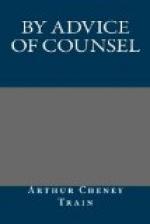“I do,” she answered with resolution.
“Your family have always lived in New York, have they not?”
“Since 1630,” she replied deprecatingly and with more confidence.
“You are prominent in various philanthropic, religious and civic activities?”
“Not prominent; interested,” she corrected him.
“And you make a practise of visiting prisoners in the Tombs?”
She hesitated. What could this be leading to?
“Occasionally,” she admitted.
“Do you know this defendant, Shane O’Connell?”
“Yes.”
“Did you see him on the twenty-third day of last month?”
“I think so—if that was the day.”
“What day do you refer to?”
“The day I had the talk with him.”
“Oh, you had a talk with him?”
“Yes.”
“Where did you have that talk with him?”
“In the counsel room of the Tombs.”
O’Brien paused. Even his miserable soul revolted at what he was about to do.
“What did he say?” he asked, nervously looking away.
Something in his hangdog look warned Miss Beekman that she was being betrayed, but before she could answer Mr. Tutt was on his feet.
“One moment!” he cried. “May I ask a preliminary question?”
The court signified acquiescence.
“Was that conversation which you had with the defendant a confidential one?”
“I object to the question!” snapped O’Brien. “The law recognizes no confidential communications as privileged except those made to a priest, a physician or an attorney. The witness is none of these. The question is immaterial and irrelevant.”
“That is the law,” announced the judge, “but under all the circumstances I will permit the witness to answer.”
Miss Beekman paused.
“Why,” she began, “of course it was confidential, Mr. Tutt. O’Connell wouldn’t have told me anything if he had supposed for one moment I was going to repeat what he said. Besides, I suggested that I might be able to help him. Yes, certainly our talk was confidential.”
“I am sorry,” gloated O’Brien, “but I shall have to ask you what it was.”
“That is not a question,” said Mr. Tutt calmly.
“What did the defendant say to you in the counsel room of the Tombs on the twenty-third of last month?” cautiously revised O’Brien.
“I object!” thundered Mr. Tutt, his form towering until seemingly it matched that of the blind goddess in height. “I object to the answer as requiring a breach of confidence which the law could not tolerate.”
Judge Babson turned politely to Miss Beekman.
“I regret very much that I shall be obliged to ask you to state what the defendant said to you. You will recall that you yourself volunteered the information that you had had the talk in question. Otherwise”—he coughed and put up his hand—“we might possibly never have learned of it. A defendant cannot deprive the people of the right to prove what he may have divulged respecting his offense merely by claiming that it was in confidence. Public policy could never allow that. It may be unpleasant for you to answer the question but I must ask you to do so.”




